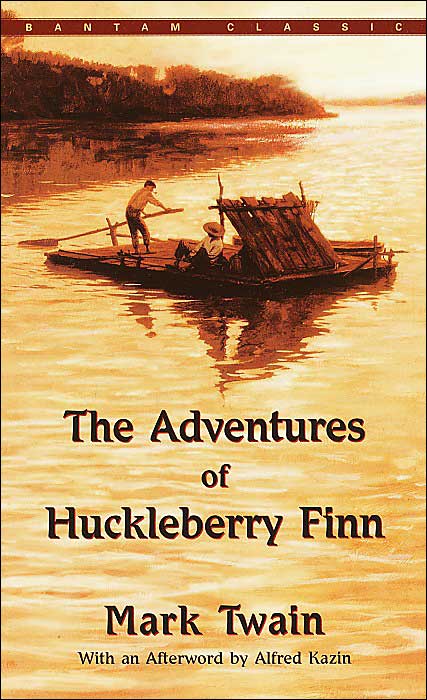Huckleberry Finn
 Mark Twain, author of The Adventures of Huckleberry Finn writes this on the first page of his book: "Persons attempting to find a motive in this narrative will be prosecuted; persons attempting to find a moral in it will be banished; persons attempting to find a plot in it will be shot." Unfortunately for the author of this paper, all three of the aforementioned punishable acts will have to be done in this report. First, the plot.
Mark Twain, author of The Adventures of Huckleberry Finn writes this on the first page of his book: "Persons attempting to find a motive in this narrative will be prosecuted; persons attempting to find a moral in it will be banished; persons attempting to find a plot in it will be shot." Unfortunately for the author of this paper, all three of the aforementioned punishable acts will have to be done in this report. First, the plot.
The story begins in St. Petersburg Missouri, where Huck Finn, who has found a considerable fortune in treasure, is taken into custody by his father. Pap, as Huck calls him, is an abusive father and a drunkard. Huck fakes his own death, escapes from his father's custody, and makes his way down the Mississippi river. While living in the wild, Huck meets up with Jim, the runaway slave of his former guardian. Huck and Jim have many adventures on the way south, including boarding with a feuding family. The two families have a fight, many men are killed, and Huck escapes with Jim. Traveling down the Mississippi, they rescued two grifters. The Duke and the King, as the criminals call themselves, are constantly scheming, and the four end up getting into much trouble on their trip south. When Jim is "captured" by the King, Huck decides to rescue him, even though he is unsure about the moral implications of rescuing a slave in the south. Huck finds that Jim is being held by the Uncle of his best friend. Huck impersonates his friend Tom Sawyer, and is taken in by the family. Tom Sawyer, shows up, and is forced to impersonate his brother. The two make elaborate plots to get Jim out of captivity, and Tom is injured in the escape. Jim and Tom are found, and brought back by a doctor. In the end, Jim is really free due to the death of his owner, Huck's father is dead, and Huck is adopted by Tom's family.
This story has an exciting and elaborate plot. Many moral conclusions can be drawn from this tale, including: people don't always know right from wrong, one should never be too careful about trusting strangers, and things always have a way of turning out right in the end.
Mark Twain may have written Huckleberry Finn to be more than just a great story. The book discusses slavery, and may be Twain's way of talking about racism. Huck knows that helping a slave escape is illegal, yet he does it anyway. Twain could be writing this book, to make people talk about racism, and maybe make some changes in the way we handle ourselves.
In conclusion, this book is filled with a great story, many lessons to be learned, and maybe even a deeper meaning.
